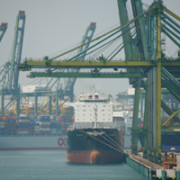Archive | March, 2014
Finance sector development
 Miscellaneous
Miscellaneous
 Regional cooperation and integration
Regional cooperation and integration
 Industry and trade
Industry and trade

US dollar outlook: Secular stagnation and the threat from the East

In the eyes of many commentators, the US dollar’s reign as the global reserve currency is under threat from two angles. The first comes from within the US—a permanent deficiency in demand or secular stagnation; and the second from the People’s Republic of China (PRC), and in particular from a fully convertible yuan. In a recent seminar tour, which covered the Asia and the US, including the Asian Development Bank Institute, we spelled out why these fears are overdone. Far from being in decline, the US is in the ascendancy in our view. We summarize these arguments here.
Was it all ‘nirvana?’ Why the emerging country gloom is mistaken

Many emerging markets assets submerged in 2013 and continued to do so in early 2014. The negative reaction of currency and stock and bond prices in several emerging markets to a cautious statement (“taper talk”) by US Federal Reserve Chairman Ben Bernanke in May 2013 was swift. In early 2014, new-year recommendations by Wall Street´s biggest banks advised clients to cut their emerging-market allocations, for a diffuse variety of reasons such as elections, violence, lack of reform, and growing debt burdens.
Can the PRC win the hearts and minds of Africa?

As economic power shifts from West to East, one of the key players affecting Asia’s rise is Africa. But as is often the case with Africa, it is often overlooked. So much is written about the rise of the BRICS countries. Indonesia, Mexico, and Turkey have recently been added to the global growth trackers’ lists. But what about Africa?
Government procurement – key element in TPP; Missed opportunity in RCEP?

Government procurement has been treated quite differently in trade agreements initiated by the US than in those that have been led by Asian governments. US-led trade agreements, including the Trans-Pacific Partnership Agreement (TPP), incorporate government procurement commitments as an important element. In contrast, Asian-led trade agreements omit or minimize government procurement provisions. The parties to Asian agreements, such as the Regional Comprehensive Economic Partnership (RCEP), should consider the benefits of including government procurement in their trade pacts.


Search
Subscribe / Connect to Asia Pathways
Subjects
- Agriculture and natural resources
- Blog
- Capacity development
- Climate change
- Economics
- Education
- Energy
- Environment
- Finance sector development
- Gender
- Governance and public sector management
- Health
- Industry and trade
- Information and Communications Technology
- Infrastructure
- Miscellaneous
- Population
- Poverty
- Private sector development
- Regional cooperation and integration
- Sanitation
- Social development and protection
- Transport
- Uncategorized
- Urban development
- Video Blog
- Water
Recent Posts
- Artificial intelligence: A new driver for inclusive growth and development?
- Increasing trust in cross-border e-commerce and artificial intelligence
- Enhancing access to maternal and newborn healthcare in developing Asia
- Can electric vehicles lead the way to a sustainable future?
- Mitigating climate-related sovereign risk to accelerate action on the climate emergency




Recent Comments